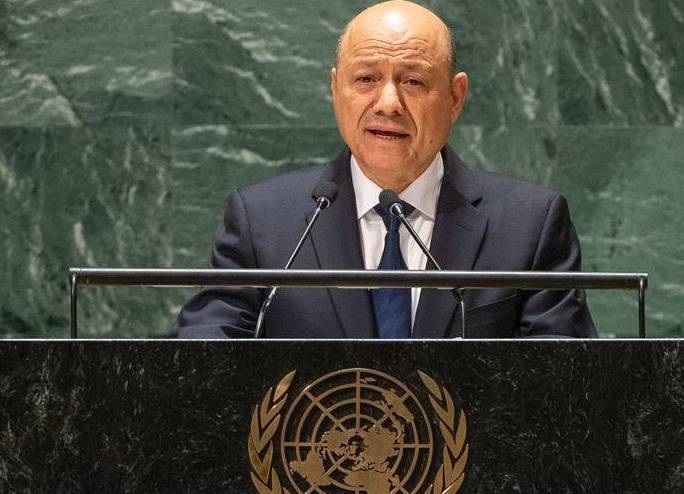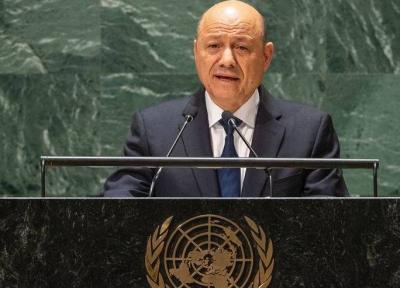The President of the Presidential Leadership Council in Yemen, Rashad Muhammad Alimi, affirmed that there is a viable and more guaranteed path to achieving peace by restoring the trust of Yemenis in international legitimacy and their national government. In his speech at the general debate of the United Nations General Assembly, Alimi stated that this requires supporting the legitimate government and enhancing its capacity to build the economy and provide services, and "reviving hope for a bright tomorrow, as mentioned by UN envoys and intermediaries everywhere."
He expressed hope for ending the long-standing suffering of the Yemeni people, noting that the peace file has been stagnant "despite the concessions and initiatives provided by the Yemeni government in support of this path." He pointed out that with ongoing efforts, hopes are renewed "for the (Houthis) to submit to popular, regional, and international will and recognize that the state safeguarding rights, freedoms, and the rule of law based on justice and equal citizenship is the only one that will make our country more secure, stable, and respected in its regional and international context."
Alimi praised the solidarity and unified position of the international community supporting constitutional legitimacy, Yemen's sovereignty, independence, territorial integrity, and non-interference in its internal affairs. Supporting the legitimate government and enhancing its capacity in economic development and service provision is the path that spares us all from dealing with the extortion of militias and disrupting the implementation of international resolutions.
**No More Concessions**
The President of the Presidential Leadership Council warned that "any leniency from the international community or dealing with (militias) as a de facto authority would make the practice of repression and violation of public freedoms a behavior that is impossible to eliminate." He emphasized the necessity of sufficient guarantees for peace, which should be based on the three agreed-upon references nationally, regionally, and internationally, and should adhere to international legitimacy. He added that sustainable peace must be founded on justice, equity, addressing past impacts, and key national issues.
Alimi also stated that "any peace initiative or confidence-building measures should be able to achieve tangible and immediate results to alleviate the suffering of the Yemeni people and benefit the victims of the conflict, especially women and children." He asserted that any leniency from the international community, neglecting the legal status of the state, or even dealing with militias as a de facto authority, would make the practice of repression and violation of public freedoms an enduring practice.
**Humanitarian Interventions**
The President of the Presidential Leadership Council explained that in order to restore trust and improve opportunities for progress in the Yemeni file, "we must acknowledge that the current path based on international humanitarian interventions needs a reassessment and radical solutions so that it aligns with international law principles and cautions related to financing terrorism, rebellion, and armed groups."
He added that while his country "welcomes the United Nations' move toward transitioning humanitarian interventions in our country to the realm of sustainable development, this shift must include pumping pledges and international financing through the Central Bank of Yemen to strengthen the national currency, curb inflation, and ensure that these funds do not indirectly support armed militias."
Alimi noted that this path is inconsistent with the international discourse seeking improvement in Yemen's economic indicators while "its international operations go through institutions that are forcefully dominated by the Houthis." He pointed out that this approach "leaves state institutions with weak readiness, a lack of financing, and inadequate resources to address cross-border challenges and the increasing humanitarian needs in the country."




